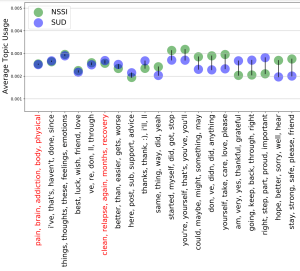 Featured Paper of the Month – October 2022
Featured Paper of the Month – October 2022
Published in Proceedings of the Eighth Workshop on Computational Linguistics and Clinical Psychology by Salvatore Giorgi and Brenda Curtis, et al. of the NIDA IRP Technology and Translational Research Unit.
Summary
Nonsuicidal self-injury (NSSI), or the deliberate injuring of one’s body without intending to die, has been shown to exhibit many similarities to substance use disorders (SUDs), for example comorbidity with anxiety and depression. Research has further shown that people who self-injure adopt language common in SUD recovery or 12-step communities. Using over 150,000 comments from approximately 5,000 people posting on the social media website Reddit, we investigate the shared language of NSSI and SUD by comparing discussions on public forums related to self-injury and drug addiction. Using machine learning based natural language processing algorithms, we automatically identify shared language across the NSSI and SUD communities, which includes SUD recovery language in addition to other themes common to support forums (e.g., requests for help and gratitude). The adoption of addiction and recovery language in NSSI communities may help them cope with self-injury, buffer against self-stigma, and encourage adoption of common SUD recovery strategies.
Publication Information
Nonsuicidal Self-Injury and Substance Use Disorders: A Shared Language of Addiction Proceedings Article
In: Proceedings of the Eighth Workshop on Computational Linguistics and Clinical Psychology, pp. 177–183, Association for Computational Linguistics, Seattle, USA, 2022.
